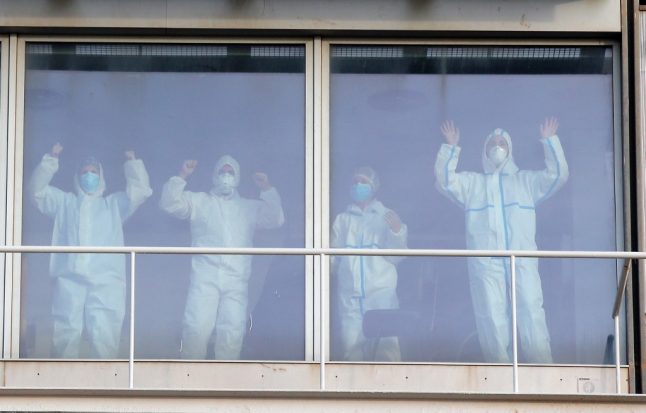With the epidemic well in remission after peaking over a month ago, Spain has begun moves to ease out of the lockdown following weeks in which the rate of deaths and new infections has steadily declined.
These latest figures confirm a trend in recent weeks that showed medical staff accounting for most new infections.
Since the epidemic began, Spain has now counted more than 250,000 infections, including those people shown to have had the virus through antibody tests.
Of that figure, 18 percent of cases — or 43,956 — have involved health staff, in what Fernando Simon, who heads the ministry's emergencies department, said was a “significant occurrence”.
Datos sobre #COVID19 en España, desde el primer caso inicial, actualizados a hoy 5 de mayo:
▶Confirmados por PCR: 219.329
▶Fallecidos: 25.613
▶Curados: 123.486Información por CC.AA.:https://t.co/kJdAiQvT2j
Más info⤵https://t.co/GH8nqIFQ4l#EsteVirusLoParamosUnidos pic.twitter.com/lXnTUj1kxy
— Salud Pública (@SaludPublicaEs) May 5, 2020
In two large hospitals in Madrid and Catalonia, the regions worst-hit by the crisis, there had been “an 11 percent infection rate among staff”, he said.
But he said infections among healthcare workers had been “less serious” than cases in the general population, which he attributed to the fact they were generally much younger.
Among healthcare workers, the mortality rate was 0.1 percent compared with 7.8 percent in the general population.
Far fewer had to be hospitalised or treated in intensive care, he said — also attributing it to the age difference.
Complaints over protective equipment
Health workers have greater access to tests for the virus, which might be one reason they feature so prominently in the official figures.
But they are also in the frontline of the struggle against the virus, treating those already infected.
At the height of the epidemic, when the country's hospitals were on the brink of collapse, medics complained of a lack of protective material such as masks and gloves.
And last week, Spain's primary care doctors association (SEMERGEN) issued a statement expressing “concern about the lack of adequate means… to avoid infection by coronavirus”.
Although such shortages were initially acknowledged by the government, in recent weeks it has said the supply of such items had been restored.
Tuesday's daily toll showed another 185 deaths over the past 24 hours in what was the third straight day the figure has been under 200 and a far cry from the 950 deaths registered on April 2 when the epidemic peaked.
Spain has been one of the world's worst-hit countries, losing 25,613 lives to COVID-19.
As the situation has eased, the country has begun to relax some of the restrictions put in place on March 14, although the government is seeking to extend the state of emergency until May 23rd.
The most recent easing measures have seen people allowed out for a walk or to do exercise and small business permitted to receive customers with a prior appointment.
READ MORE:
- Police issue 35,000 fines as Spain embraces 'freedom' after 48 days of lockdown
- Q&A: When will my province in Spain move to Phase 1?
- Coronavirus in Spain: What's the latest and what do you need to know?



 Please whitelist us to continue reading.
Please whitelist us to continue reading.
Member comments